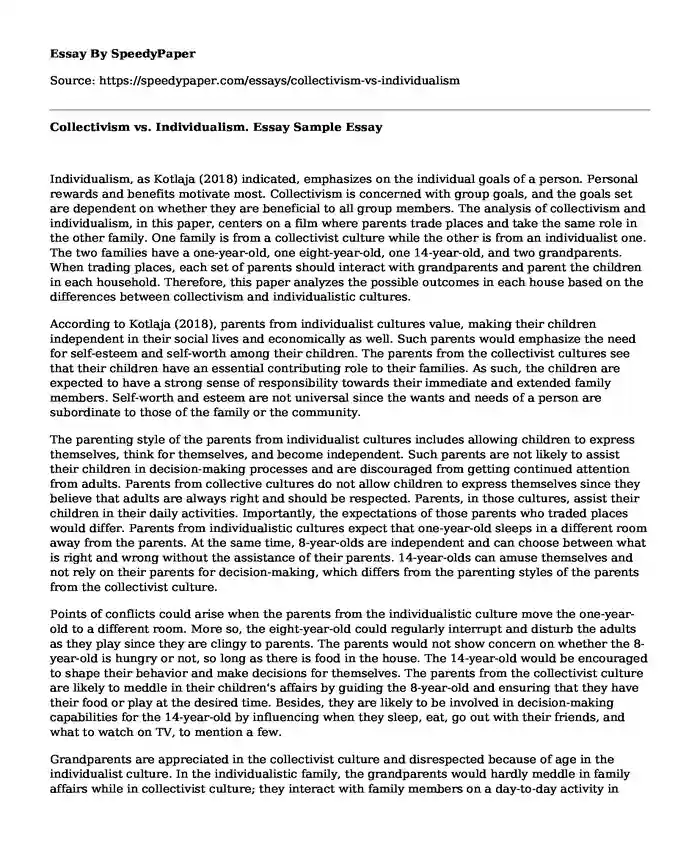
| Type of paper: | Book review |
| Categories: | Parenting Child development Relationship Human behavior |
| Pages: | 3 |
| Wordcount: | 693 words |
Individualism, as Kotlaja (2018) indicated, emphasizes on the individual goals of a person. Personal rewards and benefits motivate most. Collectivism is concerned with group goals, and the goals set are dependent on whether they are beneficial to all group members. The analysis of collectivism and individualism, in this paper, centers on a film where parents trade places and take the same role in the other family. One family is from a collectivist culture while the other is from an individualist one. The two families have a one-year-old, one eight-year-old, one 14-year-old, and two grandparents. When trading places, each set of parents should interact with grandparents and parent the children in each household. Therefore, this paper analyzes the possible outcomes in each house based on the differences between collectivism and individualistic cultures.
According to Kotlaja (2018), parents from individualist cultures value, making their children independent in their social lives and economically as well. Such parents would emphasize the need for self-esteem and self-worth among their children. The parents from the collectivist cultures see that their children have an essential contributing role to their families. As such, the children are expected to have a strong sense of responsibility towards their immediate and extended family members. Self-worth and esteem are not universal since the wants and needs of a person are subordinate to those of the family or the community.
The parenting style of the parents from individualist cultures includes allowing children to express themselves, think for themselves, and become independent. Such parents are not likely to assist their children in decision-making processes and are discouraged from getting continued attention from adults. Parents from collective cultures do not allow children to express themselves since they believe that adults are always right and should be respected. Parents, in those cultures, assist their children in their daily activities. Importantly, the expectations of those parents who traded places would differ. Parents from individualistic cultures expect that one-year-old sleeps in a different room away from the parents. At the same time, 8-year-olds are independent and can choose between what is right and wrong without the assistance of their parents. 14-year-olds can amuse themselves and not rely on their parents for decision-making, which differs from the parenting styles of the parents from the collectivist culture.
Points of conflicts could arise when the parents from the individualistic culture move the one-year-old to a different room. More so, the eight-year-old could regularly interrupt and disturb the adults as they play since they are clingy to parents. The parents would not show concern on whether the 8-year-old is hungry or not, so long as there is food in the house. The 14-year-old would be encouraged to shape their behavior and make decisions for themselves. The parents from the collectivist culture are likely to meddle in their children's affairs by guiding the 8-year-old and ensuring that they have their food or play at the desired time. Besides, they are likely to be involved in decision-making capabilities for the 14-year-old by influencing when they sleep, eat, go out with their friends, and what to watch on TV, to mention a few.
Grandparents are appreciated in the collectivist culture and disrespected because of age in the individualist culture. In the individualistic family, the grandparents would hardly meddle in family affairs while in collectivist culture; they interact with family members on a day-to-day activity in collectivist cultures. When parents swap their households, parents from the individualistic cultures are likely to maltreat the grandparent and discourage them from being involved in family matters. In contrast, parents from the collectivist cultures would appreciate the suggestions and input of the grandparents to the family.
To conclude, every individual is likely to have adapted to the other culture. Parents, children, grandparents, and viewers of the show are expected to understand the difference between parenting styles of collectivists and individualists. I believe that the experiences of all parties could lead to changes in cultural values since people can learn to live in a particular environment by adjusting their beliefs and notions.
References
Kotlaja, M. M. (2018). Cultural contexts of individualism vs. collectivism: Exploring the relationships between family bonding, supervision and deviance. European Journal of Criminology. doi: 10.1177/1477370818792482
Cite this page
Collectivism vs. Individualism. Essay Sample. (2023, Apr 05). Retrieved from https://speedypaper.net/essays/collectivism-vs-individualism
Request Removal
If you are the original author of this essay and no longer wish to have it published on the SpeedyPaper website, please click below to request its removal:
- Free Essay Sample about a Nursery Manager
- Research Design Methodology Used in Carrying Out the Study of Airbnb. Free Essay.
- The Importance of Writing for Health Professionals - Essay Sample
- Free Essay on the Death of the Supreme Court Associate
- Free Essay on Features of Equal Employment Laws
- Big Data in Healthcare - Free Essay Example
- Essay Sample on Developing Creativity
Popular categories




